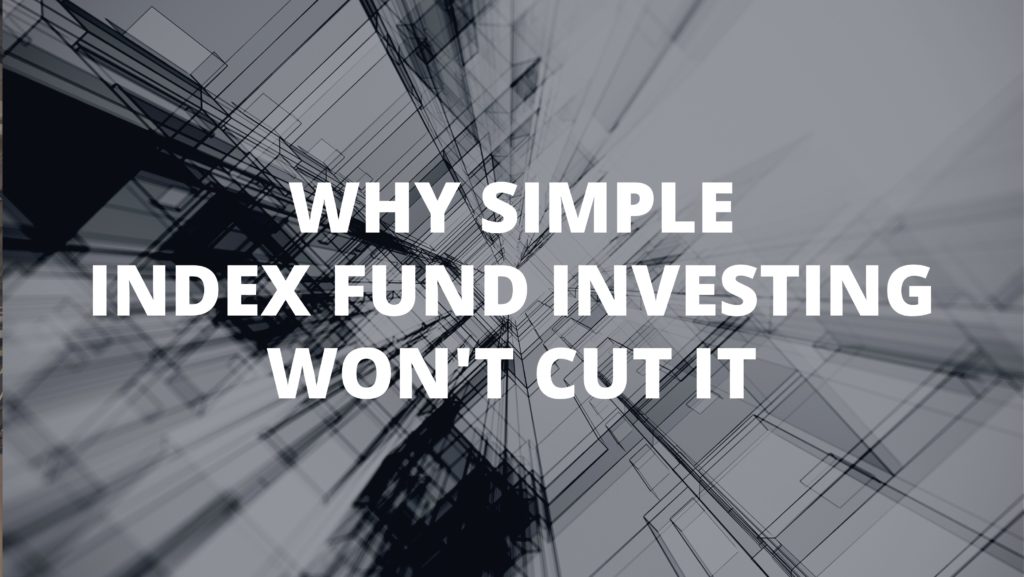Monument Wealth Management Articles
Why Simple Index Fund Investing Won’t Cut It

Share on your favorite platform, or by email
Just because you’re at a point in life where you’re not afraid of running out of money, doesn’t mean you’re okay with it being mismanaged. It irks you to no end if your money isn’t being handled efficiently, your wealth plan isn’t meeting your expectations, and when no one’s doing anything about it.
These frustrations often lead investors to the question… “Why not just put my money in a simple index fund?”
Let us share our take…
Index investing works – it’s just not a standalone approach. It’s a key component in a portfolio, but not a portfolio onto itself.
Index investing is a passive investing technique that attempts to match the returns of a broad market index, like the S&P 500. Indexing has stood the test of time and meets several, but not all, of the core principles to successful long-term investing. It harnesses two critical long-term tailwinds that benefit portfolios: low costs and broad diversification. However, most indices are not tethered to fundamentals or systematic trading, and they don’t cater to an investor’s bigger picture, like their particular wealth plan or cash flow needs.
Indexing as a stand-alone strategy falls short in four specific areas, which we’ll dive into below.
An Index Does Not Cater to Your Specific Situation
Indices represent a broad swath of an economy, a region, or a sector – but only some of these indices may apply to your specific strategy, goals, or wealth plan. Said plainly, an index does not know your specific situation. It doesn’t know your tax considerations, your risk tolerance, your time horizon for needing to access your funds, your emotional constitution, or your personal values.
If your goal is to retire, a portfolio of indices will not move in concert with your ever-changing cash flow needs, planning and financial circumstances. The yield on the S&P 500, for example, over the last few years has fallen to all-time lows and consequently is not in line with the needs of typical investors who require both income and growth. An index can’t be all things to all people.
Remember, you’re playing your own game, not everyone else’s. And your portfolio should reflect and support your specific needs and goals.
Index Investing Requires Investors to “Buy and Hold”
While an actively managed, custom portfolio (particularly one with quality companies and consistent dividend growth) can dampen volatility, a portfolio comprised solely of indices typically experiences higher volatility and often produces less cash flow to support your lifestyle.
Human behavior determines success more than any other factor, in every area of your life—including your wealth. With an index strategy, investors are typically told to “buy and hold”. The problem is, approximately once a decade, an index portfolio will lose at least half of its value (for example, see the S&P 500 index in 2000 & 2008). It is during these protracted and deep drawdowns that investors lose their long-term vision and often abandon an index strategy. Investing is not as simple as buying and holding your investments. The sage advice to “buy and hold” only works in an environment where humans have zero emotion. We don’t think that environment exists. [See our article, Behavioral Finance 101]
Index Investing Misses Key Tactical Elements
A successful long-term portfolio will incorporate key tactical elements. While indices do an outstanding job capturing broad corporate activity, they do not capture intermediate-term themes—like automation, software as a service, etc.– nor do they offer tax loss harvesting capabilities or exposure to key long-term factors inside the market like momentum, dividend growth, and changes in fiscal and monetary policy. The S&P 500 is a broad index that can play an important role in a portfolio, but these tactical considerations must also be incorporated into both the design and execution of a portfolio.
Execution Matters
Portfolio rebalancing – that is, periodically adjusting your portfolio so that your allocation remains aligned with your investment goals – is an effective tool to manage risk. Whether the portfolio comprises individual stocks or traditional indices, a portfolio must trade alongside and adapt to changes in tax policy, technology, individual investor needs (e.g. income, volatility dampening) and other external factors that are relevant to both the investor and the broader investment mosaic.
While custom portfolio rebalancing can help account for these factors, index investing tends not to be opportunistic in these ways. For example, after the 2008 recession, financial stocks and many technology stocks were both undervalued and underrepresented in the S&P 500 and have since, particularly with respect to technology, produced outsized gains that index investors missed out on. With an index, you own more of the stuff in a bubble and less of the stuff that is underrepresented in traditional indices.
Is Simple Index Investing Right for You?
A simple index portfolio has certain merits: namely diversification and low cost. Indexing should be part of a portfolio, but it shouldn’t be the entire thing. A well-constructed portfolio must be both strategic and tactical while accounting for the unique psychological makeup of the investor. It must be executed diligently to stay current and to reflect both economic change and investor preferences.
Sounds complicated? It doesn’t have to be. Not unlike a dry cleaner who proudly hangs an “All Dry Cleaning Done On-Premises” sign on their door, Monument’s in-house team of portfolio managers are responsible for client portfolios, not some third-party money manager. Managing portfolios in-house allows our team of seasoned experts to better serve you with a low-cost approach to building rules-based, diversified portfolios consisting of single securities instead of third-party products or ETFs and mutual funds alone. This not only knocks out the expense of middlemen, it ensures that your unique needs and considerations are always present in the design of your portfolio.

Don’t miss our list of “10 Things All Investors Should Know”
Ready for straightforward, unfiltered opinion and tailored advice for YOUR
questions, not everyone else’s?
IMPORTANT DISCLOSURE INFORMATION
Please remember that past performance is no guarantee of future results. Different types of investments involve varying degrees of risk, and there can be no assurance that the future performance of any specific investment, investment strategy, or product (including the investments and/or investment strategies recommended or undertaken by Monument Capital Management, LLC [“Monument”]), or any non-investment related content, made reference to directly or indirectly in this blog will be profitable, equal any corresponding indicated historical performance level(s), be suitable for your portfolio or individual situation, or prove successful. Due to various factors, including changing market conditions and/or applicable laws, the content may no longer be reflective of current opinions or positions. Moreover, you should not assume that any discussion or information contained in this blog serves as the receipt of, or as a substitute for, personalized investment advice from Monument. To the extent that a reader has any questions regarding the applicability of any specific issue discussed above to his/her individual situation, he/she is encouraged to consult with the professional advisor of his/her choosing. No amount of prior experience or success should be construed that a certain level of results or satisfaction will be achieved if Monument is engaged, or continues to be engaged, to provide investment advisory services. Monument is neither a law firm nor a certified public accounting firm and no portion of the blog content should be construed as legal or accounting advice.
A copy of Monument’s current written disclosure Brochure discussing our advisory services and fees is available for review upon request or at www.monumentwealthmanagement.com/disclosures. Please Note: Monument does not make any representations or warranties as to the accuracy, timeliness, suitability, completeness, or relevance of any information prepared by any unaffiliated third party, whether linked to Monument’s website or blog or incorporated herein, and takes no responsibility for any such content. All such information is provided solely for convenience purposes only and all users thereof should be guided accordingly.
Historical performance results for investment indices, benchmarks, and/or categories have been provided for general informational/comparison purposes only, and generally do not reflect the deduction of transaction and/or custodial charges, the deduction of an investment management fee, nor the impact of taxes, the incurrence of which would have the effect of decreasing historical performance results. It should not be assumed that your Monument account holdings correspond directly to any comparative indices or categories. Please Also Note: (1) performance results do not reflect the impact of taxes; (2) comparative benchmarks/indices may be more or less volatile than your Monument accounts; and, (3) a description of each comparative benchmark/index is available upon request.
Please Remember: If you are a Monument client, please contact Monument, in writing, if there are any changes in your personal/financial situation or investment objectives for the purpose of reviewing/evaluating/revising our previous recommendations and/or services, or if you would like to impose, add, or to modify any reasonable restrictions to our investment advisory services. Unless, and until, you notify us, in writing, to the contrary, we shall continue to provide services as we do currently. Please Also Remember to advise us if you have not been receiving account statements (at least quarterly) from the account custodian.